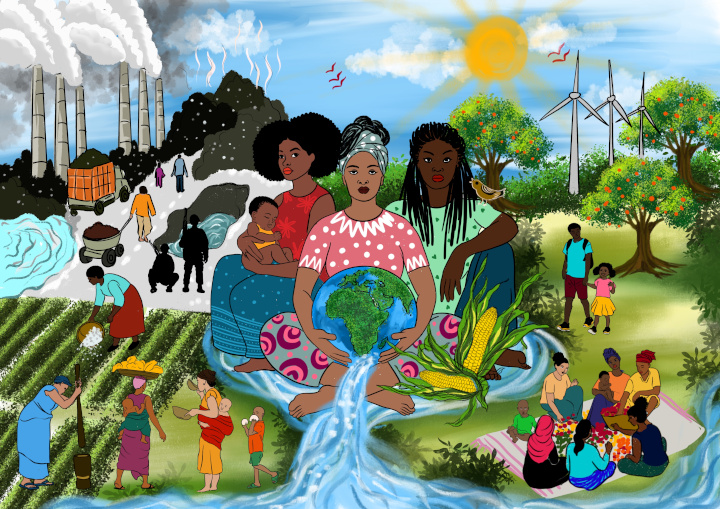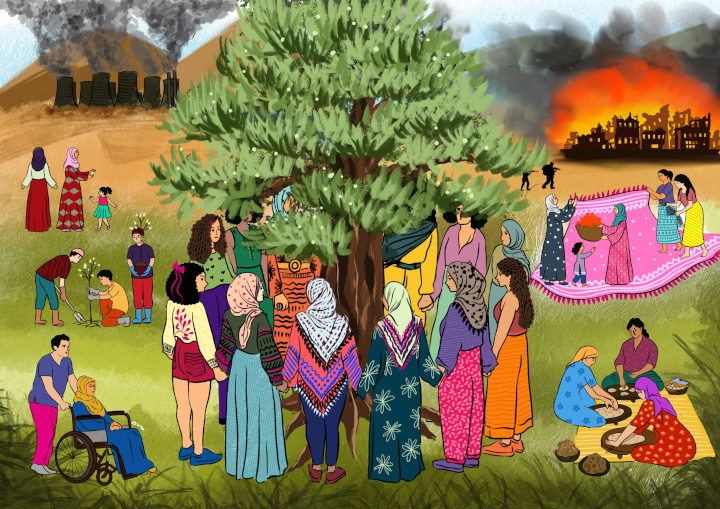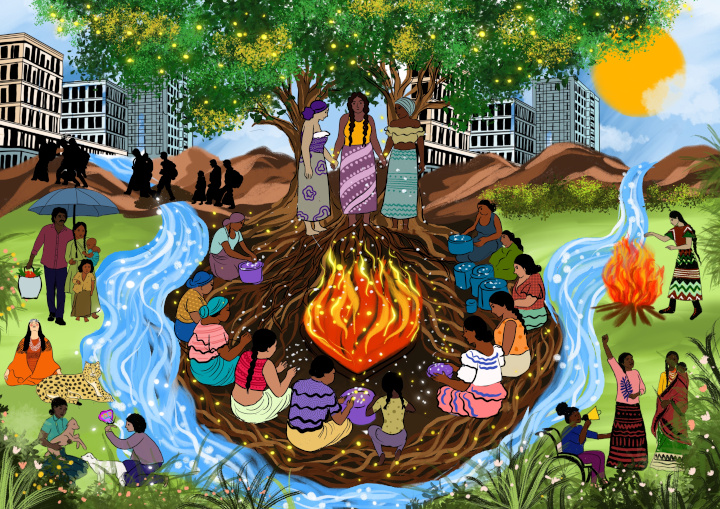
The world needs to stop relying on a metric that ignores two thirds of the work done by women and which promotes harmful policies, says Oxfam GB CEO Halima Begum. A new collection of feminist think pieces offers a compelling and inspirational tour of the arguments and pathways for moving Beyond GDP.
Unpaid care and domestic work – nurturing, caring for, nourishing and sustaining children, families and communities – is the foundation of life itself, our greatest form of collective wealth, and essential to our economies. Yet, within mainstream economics, this vital labour – some 75% of which is done by women – is largely not counted as productive work.
The remarkable fact that two-thirds of the work women do is invisible in our standard measure of the economy, gross domestic product (GDP), shows just how much and how urgently we need an anthology like Beyond GDP: A compendium of regional feminist perspectives. Curated by Oxfam, this new collection presents perspectives from leading feminist scholars and activists from the Global South. They demystify debates around GDP and make an utterly compelling case on the need to ditch it as the primary measure of economic progress. It is high time we used feminist alternatives that value care for people and planet over exploitation of women and marginalised communities, and the plundering of natural resources.
As Lumonya Faith and Jennifer Lipenga say in their contribution: “When we narrow our worldview by choosing to focus only on its material aspects, purposefully neglecting the parts of this world that make us human, the things that connect us to each other and the planet… then we become distorted in the same way that the measures we glorify are distorted. This alone underscores the necessity for measures beyond… GDP. We cannot understand the breadth and depth of the problems we face, or develop solutions, without accounting for the perspectives and realities of those who have been made invisible by the systems that govern our world today.”
So in addition to ignoring the foundations of life itself – care – what else do these feminists think is wrong with GDP? Let us count the ways…

When arms sales are valued… but not the lives destroyed
Samia Al-Botmeh highlights the perverse priorities at the heart of GDP. She points out that in her own MENA (Middle East and North Africa) region, military expenditure as a percentage of government spending is the highest in the world, and that is measured as a good thing in terms of GDP. “GDP inflated by such high military expenditure may be seen as reflecting a prospering country but, in reality, this expenditure underscores the possibility of destruction of lives and livelihoods,” she writes. And too often it is women and children who bear the greatest cost of this militarisation.
Growth at all costs
A central theme is how the drive to grow GDP at all costs extracts more and more from women’s labour in particular and damages rights, wellbeing, wages and communities. This is especially because governments often use GDP growth as a rationale to slash public services and impose austerity. Women who are racialised or face other intersecting forms of marginalisation bear the heaviest cost.
As Samia Al-Botmeh says: “GDP and economic growth rates are used as a measure of the success of neoliberal policies worldwide and in the MENA countries, which have focused on reducing government expenditure, downsizing public sector employment, reducing subsidies on fuel and staple foods, privatizing production and public services, and lifting controls on exchange rates.”

Another piece highlights the damage to small-scale and subsistence farmers in the Africa region – many of whom are women. Lumonya Faith and Jennifer Lipenga reflect on how the prioritising of corporate production and profit driven by orthodox economic priorities has disenfranchised these farmers, with negligible impacts on hunger. They call instead for a new paradigm of food sovereignty, which “is not based on abstract theories about profit, growth and GDP, but rather on human dignity, basic freedom, people’s livelihoods and wellbeing.” Citing examples from numerous countries and sectors, including rubber, tea and coffee, mining and domestic work, they also draw attention to the widespread slavery and unfree labour across Africa perpetuated by the growth-centric model. The result is a continuation of colonialism, where “colonial powers, far from disappearing, continue to expand through neoliberal economics.”
Echoing the theme of a new type of colonialism, Nalini Rathnarajah’s contribution shows how colonial rule entrenched discrimination based on caste, gender, religion, class, and ethnicity in ways that are still felt in South Asia today, while systematically exploiting the region’s natural resources and labour.
She highlights how the drive for GDP at all costs ignores the bleak reality for women workers required to keep the economy growing. In Bangladesh, the export-orientated garment industry is a major contributor to GDP, providing employment for millions of women. However, by “capitalising on the perception of women as cheap, flexible, and docile labour… multinational companies exploit the patriarchal system to maximize profits by devaluing women’s work, often resulting in lower wages and poor working conditions for female workers”.
Indigenous concepts point the way forward
Other authors highlight how Indigenous peoples have historically used concepts of wellbeing that capture far more than the narrow concerns of GDP. In her reflections of the LAC (Latin America and the Caribbean) region, Natalia Quiroga Diaz shares numerous indigenous concepts of wellbeing that emphasise the importance of living in harmony with one another and with nature. These include the Buen Vivir (good living or living well) approaches developed by different peoples across Latin America, including the Suma Qamaña concept of Bolivia’s Aymara people, Küme Mogñen of the Mapuche people, and the Sumak Kawsay, articulated in Ecuador’s constitution.

She contrasts this holistic and humane understanding of the economy and society with modern mainstream economics that only sees nature as something to exploit for profit: “Acknowledging the plurality of visions in Latin America casts doubt on the project of modernization and colonization, which has assumed a separation between nature and culture and created economies that are structured according to growth and development targets.”
Alternatives must value women, life and planet
It feels like people in power are starting to listen to the Beyond GDP movement. In an encouraging step, at the UN Summit of the Future last September, global leaders agreed to develop a set of Beyond GDP metrics in time for next year’s General Assembly. However, it is vital that any new measures don’t simply reproduce many of the problems with GDP itself and actually drive better decision-making. As it is, few of the myriad of existing alternatives have done much, if anything, to disembed patriarchy and colonialism from our economy. As Natalia Quiroga Diaz says. “The construction of alternative measures should take into account the immeasurable value of all forms of life.”
What is included in any alternative frameworks, their ultimate goals, as well as how they are developed, implemented and financed, will be critical in determining whether they catalyse systemic change or amount to tinkering around the edges with no meaningful impact on peoples’ lives. There is a real risk the new metrics will remain top-down, depoliticised and under-funded, providing a mirage of progress while the juggernaut of neoliberal growthism rumbles on, taking us towards an existential brink.
Global South countries also need the policy space and resources to develop and invest in a just transition to feminist wellbeing economies that reflect their unique contexts and desired development pathways, away from GDP-growthism. This means Global North countries must do much more to tax wealth and climate-damaging industries, cancel debt, and relinquish their stranglehold on global economic decision-making.
Will policy-makers listen?
This collection comes at a critical time. Gains in gender justice have been rolling back and are under attack; economic inequality within and between countries is on the rise; and the climate crisis is intensifying. Right at the heart of these crises is an obsession with increasing GDP that is skewing policy-making towards measures that exacerbate care loads, worsen gender, race and class inequalities and push countries towards prioritising profit over wellbeing.
If we are to develop measures that instead promote economic and gender justice and that truly value women and planet, then we must listen to the voices and perspectives of feminist movements and networks. That’s why this new collection is so important – and why policy-makers need to pay attention to it.

Halima Begum is chief executive of Oxfam GB.
Watch the recent webinar that marked the launch of the new Beyond GDP compendium.
Read the full collection: Beyond GDP: A compendium of regional feminist perspectives (available in English, Spanish, French and Arabic)
And find out more about the Beyond GDP movement in this Oxfam paper: Radical Pathways Beyond GDP: Why and how we need to pursue feminist and decolonial alternatives urgently
This is awesome.
SIRP Nigeria is a feminist organization committed to promoting economic and gender justice that truly value women and the climate.
We will value your continuing guidance and support.
We will value your support in the coming year.
Keep up the good work you’re doing.Its appreciated.
sirp.nigeria@gmail.com
“too often it is women and children who bear the greatest cost of this militarisation.”
Is this true? Not that it would be an advantage if men bore the greatest cost of militarisation – any and all victims of militarisation are equally valid.
This is an incredibly dispiriting piece of work and I’m really astonished that you published it – based on the hedging throughout it is clear you understand that there is absolutely nothing of value here, eg.: “There is a real risk the new metrics will remain top-down, depoliticised and under-funded … it is vital that any new measures don’t simply reproduce many of the problems with GDP itself and actually drive better decision-making.”
Yes, obviously, because our system production isn’t a product of the bad incentivisations built into GDP. Rather, GDP is a relatively accurate measure of how our system of production creates wealth: tweaking our measuring devices will not reconstitute the global economy, why would it?
But of course you know this, correctly noting that “…few of the myriad of existing alternatives have done much, if anything, to disembed patriarchy and colonialism from our economy” – precisely! I remember a few years back the buzz around the Gross National Happiness Index (GHI) and similar proposals, which sought to do a similar to thing as this project; predicated on the same idea that “Right at the heart of these crises is an obsession with increasing GDP that is skewing policy” they therefore figured that GDP itself merely needed to be swapped out for GHI or ‘Buen Vivir’ or ‘Suma Qamaña’ or ‘Island Time’ or ‘Girl’s Night’ or ‘That Friday Feeling’ or whatever you want to call it – it means nothing, it changes nothing, because businesses still have the same imperatives and do not care whatsover for your competing instrument that corrects for this or that externality your model corrects for.
Shot through the whole piece is this idea that the economy is made of perceptions – describing Western countries abroad as “capitalising on the perception of women as cheap, flexible, and docile labour” – are they capitalising on a *perception* or an economic reality, one that cannot be erased with an ad campaign or by coming up with a new mathematical formula.
Not that there is much interest in acknowledging that this, ie. that adjusting how an index is generated is the task you have set for yourself. One of the writers states that we need a new paradigm, one that “is not based on abstract theories about profit, growth and GDP, but rather on human dignity, basic freedom, people’s livelihoods and wellbeing.”. I am afraid to tell her she has contributed to the wrong project.
The ‘beyond GDP’ model will, by its very nature as a model, have to peddle in abstractions; and, in a quite horrifying manner, you will even have to reduce your desired outcomes – human dignity, basic freedom, people’s livelihoods and wellbeing – down into abstract theories and cold numbers! One writer says “The construction of alternative *measures* should take into account the *immeasurable* value of all forms of life” – I assume this is supposed to come across as a thoughtful flourish but it has a really cynicism to it, a cynicism that runs through this whole project; you know this is going nowhere, that you are writing another futile article about helping the oppressed in a long life of writing futile articles about helping the oppressed. Thank goodness you know that this won’t move the needle on improving society whatsover – that means you can do a follow-up collection next year!
All in all I hope this is just poorly thought or rushed, rather than the product of a group of people who have lost interest in changing the world but have contented themselves to continue to act out the motions. Please think about why you are doing this.
In retrospect my previous comment is definitely overly negative, apologies for the antagonistic tone!
That said, I do think there’s a deeply problematic cause:effect mix-up here which weakens the potential impact of the piece significantly.
Additionally, there a frustratingly limited engagement with the reality of having to convert a lot of the intangible goods the writers put forward into quantifiable data that can be fed into any ‘beyond GDP’ metric: is Sumak Kawsay still Sumak Kawsay after its essence is taken and rationalised into a series of metrics and indicators? Or is there something essentially anti-rational (not in a pejorative sense – most human passions and interests defy the cold edge of rationalisation!) about these concepts that would be lost if forced to comply with the limitations of a ‘beyond GDP’ index?